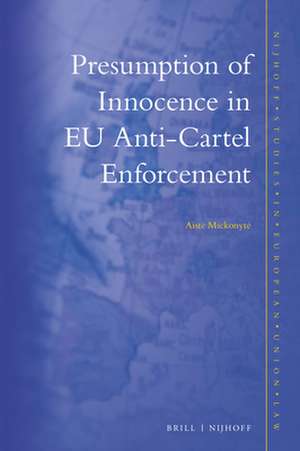Presumption of Innocence in EU Anti-Cartel Enforcement: Nijhoff Studies in European Union Law, cartea 15
Autor Aistė Mickonytėen Limba Engleză Hardback – 5 dec 2018
Din seria Nijhoff Studies in European Union Law
- 18%
 Preț: 842.36 lei
Preț: 842.36 lei - 18%
 Preț: 871.63 lei
Preț: 871.63 lei - 18%
 Preț: 748.42 lei
Preț: 748.42 lei - 18%
 Preț: 926.81 lei
Preț: 926.81 lei - 18%
 Preț: 961.42 lei
Preț: 961.42 lei - 18%
 Preț: 971.31 lei
Preț: 971.31 lei - 18%
 Preț: 852.65 lei
Preț: 852.65 lei - 18%
 Preț: 763.06 lei
Preț: 763.06 lei - 18%
 Preț: 1185.52 lei
Preț: 1185.52 lei - 18%
 Preț: 832.88 lei
Preț: 832.88 lei - 18%
 Preț: 1056.86 lei
Preț: 1056.86 lei - 18%
 Preț: 963.07 lei
Preț: 963.07 lei - 18%
 Preț: 1035.93 lei
Preț: 1035.93 lei - 18%
 Preț: 712.65 lei
Preț: 712.65 lei - 18%
 Preț: 1028.75 lei
Preț: 1028.75 lei - 18%
 Preț: 857.61 lei
Preț: 857.61 lei - 18%
 Preț: 985.58 lei
Preț: 985.58 lei
Preț: 812.96 lei
Preț vechi: 991.42 lei
-18% Nou
Puncte Express: 1219
Preț estimativ în valută:
155.56€ • 162.83$ • 129.48£
155.56€ • 162.83$ • 129.48£
Carte indisponibilă temporar
Doresc să fiu notificat când acest titlu va fi disponibil:
Se trimite...
Preluare comenzi: 021 569.72.76
Specificații
ISBN-13: 9789004384668
ISBN-10: 9004384669
Dimensiuni: 155 x 235 mm
Greutate: 0.45 kg
Editura: Brill
Colecția Brill | Nijhoff
Seria Nijhoff Studies in European Union Law
ISBN-10: 9004384669
Dimensiuni: 155 x 235 mm
Greutate: 0.45 kg
Editura: Brill
Colecția Brill | Nijhoff
Seria Nijhoff Studies in European Union Law
Notă biografică
Dr. Aistė Mickonytė, LL.M. (2017), University of Graz, Austria, is Scientist at the University of Graz. Recently she has published on EU law perspectives on the right to a name, freedom of religion and freedom to conduct business.
Recenzii
'The book undoubtedly highlights the importance of the presumption of innocence in the debate on the acceptability of the EU level doctrine of parental liability for antitrustviolations,and for that its author should be applauded.' Peter Whelan, Common Market Law ReviewVolume 57, Issue 3 (2020) pp. 958 – 960.
